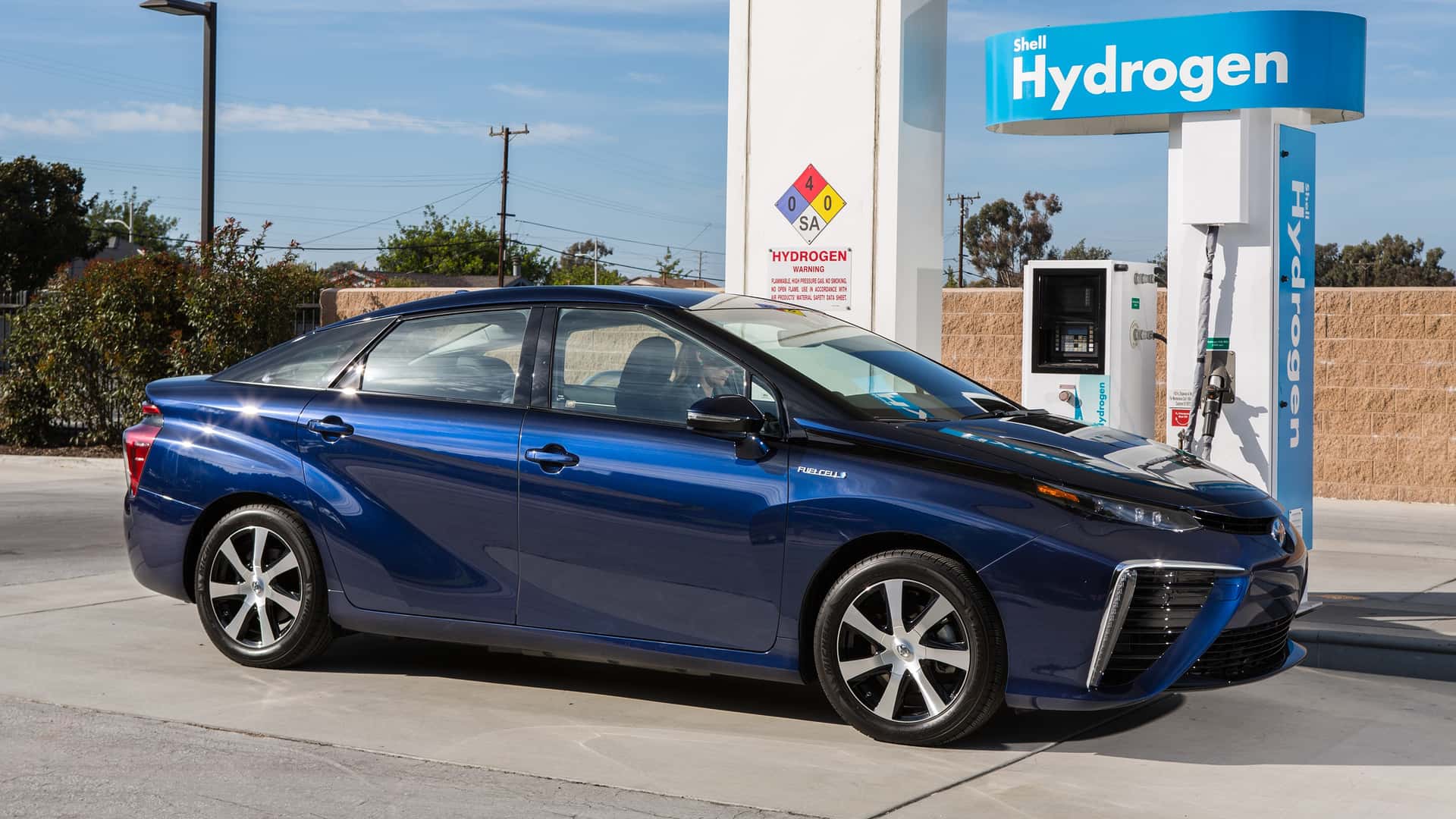Shell Is Immediately Closing All Of Its California Hydrogen Stations | The oil giant is one of the big players in hydrogen globally, but even it can’t make its operations work here.::The oil giant is one of the big players in hydrogen globally, but even it can’t make its operations work here. All seven of its California stations will close immediately.
Looking forward to the upcoming Toyota announcement that they believe in the future of hydrogen more than ever
Toyota, and Japan as a whole, are in a tricky situation with their electric grid. It’s been developed separately by nine different companies in each region; the southern regions use 60 Hz supply cycles, where-as the northern regions (including Tokyo Electric) use 50 Hz. Add to this the populations reluctance for nuclear power after Fukushima, and you get a very fragile supply grid with limited capacity. Toyota is gunning hard for Hydrogen because Japan itself can’t support EVs and for some reason it doesn’t want to/can’t manufacture both.
Okay, but if they don’t have the electricity for EVs they definitely don’t have enough electricity to waste 2/3 of it turning it into hydrogen and back.
Over 75% of Japanese energy is imported under current circumstances and they have a reluctance to use geothermal for social and economic reasons. Wind is another good choice but they’re restricted in where they can deploy it by social and economic concerns
And this is the same country that wanted to mine cobalt off the nearby ocean floor a decade ago. What a strange world.
I mean yeah, but on the other hand with hydrogen you have much more control over when and where you use the electricity as you can choose to manufacture most of it during off-peak periods and when renewables create excess energy. Then you can transport it by pipes or by trucks/ships without overwhelming the electric grid.
You can do off-peak charging with EVs too, that’s not a magical hydrogen thing. My hot water system is on its own circuit which can be turned off by the power company whenever they need to cut demand, providers have been doing that sort of thing for decades.
So providers just prevent people from using what is potentially their only transportation option as it suits the power company?
Hot water isn’t usually a survival need as long as you have liquid water available. Means of movement can be.
They don’t just… leave it off. They turn it off for like 15 minutes in the middle of an 8 hour charging session. Nobody notices or cares.
So providers just prevent people from using what is potentially their only transportation option as it suits the power company?
No? Thats effectively the same thing as a gas station closing. You can go elsewhere to charge it.
You can’t store the power in EVs for weeks and weeks and also you can’t move it around on a whim, without loosing that stored energy.
What? Of course you can store power for weeks. It doesn’t just dribble out onto the floor. Go away for a month and come home, your EV is still sitting there with the battery charge whatever you left it on.
Yes, EVs use their stored energy for driving… I’m not sure what your point was there. Do you think transporting hydrogen is free and doesn’t cost energy?
No, it doesn’t dribble on the floored, but to keep the battery conditioned takes a lot of energy. There are countless post around all sorts of forums where the battery was empty after 2 weeks, because cooking the battery in the summer heat took a lot of energy. And you can’t leave an EV plugged in at the Airport.
Transporting hydrogen is cheaper than having to rebuild a whole power grid.
So, let’s say I leave an EV at the airport, with 60% charge, battery in reasonable health, and return 2 months later and head home, having lost maybe 3%. You are telling me that’s…not doing exactly what you’re saying I can’t and didn’t just do?
You don’t also immediately lose all the stored energy either. In a (hypothetical, future tyme) properly kitted out scenario, I leave my EV plugged in at the airport and it’s battery contributes to local grid storage while I’m away. So the 60% I arrived with might drop down during high load, but since my utility company has a handy app I can schedule when I need to unplug and ask for the charge percentage to be topped up in time.
I might even not have to pay to park my car in that scenario, or potentially even earn credits back…
You will not have lost 3%. You will have lost 30-40% - because no Airport has (and probably never will have) Parking, where you can leave your EV plugged in.
That’s more an issue with hydrogen than it is with EVs. Hydrogen is very leaky.
No it isn’t. Toyota and Hyundai have had tanks for years now that are not leaking anything. Same goes for Linde.
The electricity for Hydrogen isn’t bound to any place. If they put up 10 offshore wind turbines exclusively for Hydrogen, that hydrogen can be shipped around the country as needed and wanted. That’s not possible with Grid power and especially not when they have different systems in place.
Transporting energy isn’t possible with grid power? Really? That’s what grids are for.
Yes, they have the issue of separate incompatible grids, but building complicated interconnects is still going to be easier than building and operating a hydrogen trucking industry.
still going to be easier than building and operating a hydrogen trucking industry.
Why would you have to build anything? We already truck gas everywhere. It’s a simple conversion.
Trucks and trailers aren’t new, it’s the filling and emptying facilities combined with the sheer number of trucks.
Trucks can’t hold very much hydrogen gas - you need a lot of trucks to transport a useful amount of hydrogen. One truck only carries enough hydrogen to fill 75 cars, so you’re looking at needing fourteen times as many hydrogen trucks as we have fuel trucks. If filling stations were actually busy, you’d be looking at multiple deliveries per day.
All that infrastructure, trucks and drivers costs a lot of money.
much hydrogen gas
You don’t transport it or store it in gas form.
One truck only carries enough hydrogen to fill 75 cars
Since you got the above fact wrong, this MUST be wrong. I’d like to see where you got this figure from if you’d care to share.
Spoken like someone who’s never seen a land remediation project at a former gas station site.
It’s only simple on paper.
Considering that they need to go under land remediation anyway… I fail to see how it’s a problem to do it just a little earlier and keep the land/infrastructure in use.
Maybe easier, but not cheaper. Transporting hydrogen around is already being done as well - you don’t have to develop the wheel again.
It’s actually a lot more work than “add more electricity”. It’s a load demand issue in areas, and if there’s a bunch of high load electric cars trying to charge that needs all the extra equipment and transformers and larger gauge wiring and stuff to go with it.
Like, look at your house. You may just have a 100 amp breaker box on it. Now you couldn’t handle a high-speed charger pulling 40 amps for your car, 30 for the hvac, 20 for lights/tv/computers etc, and then trying to get another 15 or so from and oven or vacuum cleaner. You’ll need a bigger amp breaker box, only you can’t just install that because the line running to your house also isn’t big enough, so you have to have the electric company come out and install a bigger line. But if too many houses in the area need all that, then the main run of lines and equipment going to that neighborhood will also have to be built up.
Toyota doesn’t like all electrics because they don’t want to add a $15,000 battery to a vehicle and make it weigh 1,000 pounds more for a vehicle that will no longer be in working condition 15 to 20 years later. They’ll fully change their tone once battery tech gets better than lithium based stuff made today. Until then hybrids are great. Cheaper lighter batteries with no range issues and easy to replace the batts when needed.
Like, look at your house. You may just have a 100 amp breaker box on it. Now you couldn’t handle a high-speed charger pulling 40 amps for your car, 30 for the hvac, 20 for lights/tv/computers etc, and then trying to get another 15 or so from and oven or vacuum cleaner. You’ll need a bigger amp breaker box
I’m not sure if you know this, but there are smart chargers that include a sensor to put on the feed going into your house. The charger can throttle up and down as you turn stuff on and off to keep the house’s total power draw under the limit, so you run all your stuff and the car just gets whatever’s left over. You can even have dozens of chargers in a parking garage and program the chargers to share a limited grid connection.
EVs aren’t a fixed load, you can ramp them up or down or shut them off as needed, so they’re pretty easy to accommodate.
I give simple examples of power load issues and some of y’all take it like a literal argument against just some examples and then the problem goes away. Good grief. Essentially your “easy to accomadate” is just everyone use less power and charge your cars longer".
This is really not a blocker - you don’t need that high a charger, you don’t need to run it full time, nor are you running everything else full time.
People forget about time of use metering and that this is a gradual phase in over a decade or more. A little bit of certainty in expectations should make this much easier to plan for.
My charger has a configurable limit, and can be programmed to be active at specific times. I don’t have incentive to do that because I have flat rate metering and sufficient electrical service but I could configure it to be much more friendly to limited service.
I’m not sure I buy that. Yes, their electrical grid is a mismatched nightmare, that they should have taken the hit on decades ago. However I see that small chargers for things like phones can adjust to pretty much any electrical grid: why shouldn’t we expect the charger in the car to be equally flexible? Either way, it’s converting to DC
Edit: the article didn’t talk about the differences, except frequency: if the only difference is 50Hz vs 60Hz, most analog electrical stuff probably also works on both. The real problem is they don’t have interconnects nor do they have a regulatory structure allowing separate generating oroviders
My main point was about capacity, and how the separate grid(s?) hinder attempts to add the capacity needed for EVs. I wasn’t really clear on that though. mb
I thought auto ranging power supplies were typically for voltage but not frequency.
Every one I’ve seen gives ranges like 100-240v ac, at 50-60 Hz.
Then electrical grids are large complex systems defined in analog days and subject to variances for weather, usage, distances, etc, so they also need to support that variability
Even larger appliances like refrigerators, ovens/ranges, etc? Some of these might be 10+ years old.
Digital power supplies usually support most electrical grids
Analog electrical stuff must handle the allowed variability in the grid and may be able to adjust from 60Hz to 50 Hz: for example a clock probably uses a crystal to establish a reliable frequency instead of relying on the grid frequency. Some labels may include this info, especially since everything has been globalized. However it’s going to depend. Some will. Some won’t.
However analog electrical can’t usually adjust between 120v and 240v, or similar, depending on where you are. This is the part where things can fail spectacularly
They also recently announced an anhydrous ammonia engine.
They really really don’t want to do an electric car. Anhydrous ammonia is insanely toxic. You ever spill a like a few drops of gas at the pump and get it on your pants or shoe? Annoying but not a big deal. Do that with anhydrous ammonia and you’ll be in the hospital.
It can also be used to make methamphetamine.
Erm…so…the need to speed, for speed, by speed precursor?
Going to guess this will not change their goal of 200k hydrogen vehicles by 2030. They currently have about 14k out on roads.
As two major manufacturers double down on developing hydrogen cell cars.
The complaints about electric infrastructure not being ready for widespread adoption but people championing hydrogen cell just boggles my mind.
I was excited for hydrogen back in the day but it seems like we’ve known for years that it isn’t the way to go. Why is anyone still fucking with it? Do these cars get 2,000 mile range or something?
Hydrogen was the future in the 90s, when the alternative was lead acid batteries. Nowadays hydrogen fuel cell cars don’t actually top the charts on range, battery EVs have taken the crown.
Hydrogen promised to be a drop-in replacement for fossil fuels. You still needed big industry to make and distribute it, you still needed filling stations to sell it to end users, you still took your car somewhere to fill it up. Everyone could just keep doing their thing. But it was going to be so expensive to switch over that everyone dragged their heels and kept using fossil fuels, so now we’re entering the post-hydrogen car era without it ever arriving.
If we’d had hydrogen fuel cell cars 30 years ago, today we’d have manufacturers putting bigger batteries and charging plugs on them to make plug-in hybrids and move away from expensive hydrogen.
I think this highlights it perfectly. The other reason teasing hydrogen was so popular with the established fuel companies, is that it meant we’d still “need” them, because it used similar distribution networks.
But the other side of their money making systems meant that they didn’t move quickly enough, and we may have just moved on past now.You also have to get hydrogen in any significant amount from natural gas wells, which is why Shell was behind it. It was not a true solution.
Hydrogen will be a big chunk of the future but probably not in cars, or generally car-sized vehicles, unless we’re talking stuff like catastrophe relief (and with that ambulances, fire trucks etc) because it’s a good idea to be able to fuel those things even if the grid is down.
We’ll need hydrogen infrastructure and production anyways for steel smelting as well as the chemical industry, those are things that just don’t run on electricity, no way. With that in place hydrogen is going to be available pretty much all over, similar to how you get natural gas anywhere nowadays. And then you have an unelectrified railway somewhere, electrifying it would cost a fortune and not amortise, but a fuel cell locomotive? Sounds easy and reasonable. Flow batteries are also an option in that kind of operation but you really need a lot of space to get power output from those so they wouldn’t work for an ambulance.
So if you’re a car manufacturer with your head screwed on right you’re probably not developing and selling hydrogen cars now because they believe they’re the future, you’re doing that to have affluent liberals pay for your ticket to play in the future market of hydrogen utility vehicles.
Also of note: European car manufacturers at least seem to be completely fine with there being fewer cars on the streets. First, they can also make money off building public transport infrastructure and running car shares, secondly, cheap everyday cars aren’t that profitable, if the cars they then do get to sell are fancy with high profit margin that’s completely fine with them. Their suppliers care even less, a seat manufacturer doesn’t care whether the seat ends up in a car or a train.
Also of note: European car manufacturers at least seem to be completely fine with there being fewer cars on the streets.
That’s a lot easier in countries whose cities are closer together and were devolved centuries before the car was invented.
That’s a lot easier in countries whose cities are closer together and were devolved centuries before the car was invented.
You should look at pictures of Amsterdam in the 70s, 80s, completely car-dependent. Europe made the same mistakes as the US regarding the car, difference is we noticed the mistake and what you see now is the product of decades of rolling back those decisions, first hesitantly, now quicker.
Also cities being further apart is actually an argument for more trains.
Yeah, I would love to have fewer cars on the streets too.
Unfortunately it looks like most Americans are going to be priced out of private car ownership long before we have any sort of suitable alternatives.
That’s not something I’m looking forward to. When enough people can’t afford to get to work but have no other way to get there.
Can’t be investing in new mass transit or walkable cities when the highways are in a state of disrepair. Nobody even takes mass transit anyway.
I would. Believe me I hate the 1.5 hour drive into the office and 2.5 hour drive back. Except they changed the train schedule on me so there are no routes that work with my schedule, and once I add in the slowdowns and congestion on the subway, it’s almost faster (and certainly more convenient) to drive. And then everyone else has the same idea and then the highways are even more congested. And then there’s less funding for mass transit because nobody wants to use it.
So glad I get to work from home 99% of the time. I’m not going back to that drudgery.
I am also interested in the flow batteries.
We’ll need hydrogen infrastructure and production anyways for steel smelting as well as the chemical industry, those are things that just don’t run on electricity, no way.
I’m curious how you see hydrogen being used in smelting. Hydrogen fuel cells do just produce electricity. Are you talking about something else, like combusting the hydrogen?
Iron ore + hydrogen = Iron + water. It’s used to tear oxygen off the ore, currently that’s done with carbon, generally of fossil origin. thyssenkrupp is already doing it at scale. Not all the hydrogen they use right now is green but unlike the old furnaces the new ones are ready to be carbon-neutral, they just have to switch over fuel sources no need to mess with the furnaces themselves.
It is possible to do the reduction directly with electricity but that’s less energy-efficient than going via hydrogen. For the chemical industry the situation is even more extreme they need hydrogen as an ingredient for the final product, not just as a reactant.
Because batteries suck for any application where weight (ie. energy density) matters. Running long haul semis off batteries is not a super practical thing. Even with consumer cars, there are people for whom hydrogen will be a better fit.
Basically we’ve been in a world where the happy medium of energy density and efficiency (gasoline) was used for everything. Now we likely need to split those things up into what energy density is more important for, and what energy efficiency is more important for.
I thought for a long time that aviation might be the application where hydrogen actually wins out. Density-to-weight is crucial. But I don’t see much activity on that front. It has the same problem as all other applications: you’d need the hydrogen infrastructure to be available everywhere. Batteries will always have one benefit: they’re easier to transition to because we already have electricity pretty much everywhere. Electric autos haven’t been overly handicapped by the lack of charging stations because many can just charge at home. Hydrogen aviation would require large regional or even international coordination to ready the fueling infrastructure. And that little issue about the compressed flammable gas keeps nagging… seems like it would make surviving a plane crash even harder.
There’s a lot of activity on the hydrogen-fueled aviation front.
https://www.popsci.com/technology/hydrogen-fuel-cell-aircraft-explained/
The infrastructure issues for planes are way less. You need fuel available at airports, which significantly fewer and farther between than consumers require for cars. Planes (and least of the jet variety) already use specialized fuel they keep available at airports. The phase-in is a lot easier too, since most running planes only travel between a few airports in their route — so you’d only need the hydrogen fuel available at the airports hydrogen planes are using to start.
There’s certainly a lot of challenges to solve there too, but hydrogen remains the most promising solution for decarbonizing air travel.
Yep I saw that story as well but it kind of makes my point: the first flight took until 2023 to happen. Thats not what I call “a lot” of activity.
You’re succeeding at favorably comparing the infrastructure challenges of hydrogen aviation to the infrastructure challenges of hydrogen for private cars, but that’s not really the bar to meet. All air infra is more consolidated than that of ground transport. The argument works for batteries just as easily.
Batteries (currently) are way too heavy for commercial planes. They can be used for the smaller propeller planes, but not for jets.
I don’t know what you were expecting to see to indicate activity. Flight tests are a pretty far along milestone, given the expense and time it takes to make a test plane. That nothing went wrong on the test flight is even more impressive, given that the engineering of using hydrogen in planes is still ongoing (as the article mentions).
Yea it’s such a weird direction to go right night. Manufacturing and delivery of hydrogen for fuel cells is complex, expensive, and poses some unique dangers with the temps and pressure of the hydrogen. It’s cleaner, assuming manufacturing of the hydrogen uses green energy, but right now most energy production isn’t green.
It has its advantages but some pretty big disadvantages too. I don’t think it’s the way to go just yet. Maybe eventually but not today I don’t think.
I could see it being used to power ships and aircraft, but it is way too complicated to deal with it for Joe average and his SUV. The stuff has to be at cryogenic temperatures to be usable, do you really want your average idiot dealing with cryogenic liquids when they are absolutely going to spill it on their foot?
It’s too dangerous, you need serious people in hard hats and yellow fluorescent jackets to deal with it safely.
The problem we have is energy density. Gasoline is pretty damn dense energy-wise. Storing 20-30 gallons of gas in a tank That’s easy and safe to refill is hard to replace.
Lithium ion and lithium iron phosphate batteries are slow to refill.
Hydrogen is kind of neat. You can make it from splitting water with solar or nuclear. It’s also a byproduct of the oil industry. And you can fill a tanker up or even an entire train and move fuck ton of hydrogen from one place to another. You can pipe it, people can generated for themselves and get a byproduct of pure oxygen.
But alas, it’s still hydrogen. Give it access to the air in a little bit of fire and it makes a big boom. The infrastructure is very expensive to build out, and we’re not swimming so much and renewables then it makes sense to bottle it up and sell it to people.
It can make sense for limited uses like cross country trucking (or maybe airlines) where battery will probably never have the range and you live and die by the schedule and refuel stops need to be relatively quick. Refilling semis at a limited number of truck stops with hydrogen stations can be useful if you can also get non petro-derived hydrogen. But for soccer moms and commuters it makes zero sense. Just charge smaller batteries at home and work and have a good interstate charging network for longer trips. We just need to normalize taking breaks on a road trip. It’ll help make more relaxing drives anyway and people already drive angry.
I’d just as soon see the majority of long haul trucking be replaced by electrified rail.
Likewise with a big chunk of the airline industry.
Oh absolutely. Rail is a better option for almost everything. However, some stuff will always need trucking (oversized, dangerous cargo, rural, etc.) but also the US is currently so overrdependent on roads it’s at least an intermediate tool.
I really wanted to see solar to hydrogen storage and then a hybrid fuel cell plus battery powerwall. Use all the solar that you get in the morning and not have to burn a battery pack out every 5 to 10 years.
You could do the same with the car, throw a small fuel cell plant in there a couple liters of hydrogen and a decent but not too big battery pack. When you park your car at work or at home it just sits there and slowly charges when you’re not paying any attention. If it gets into a true low state or you know you’re going to need it the next day to go further you can plug it into your home electric. It’s just absolutely reasonable to put enough solar on a lot of houses that you could be completely sufficient from the grid.
I don’t understand why people think we have to pick a single solution for all vehicles on the road. We can have BEV and hydrogen at the same time.
It’s about infrastructure. You can half-arse two things, or whole-arse one thing.
I agree this is a significant factor. I saw some documentaries talking about the decisions we made with the power grid pros/cons wise when you consider ac/dc. No the band 😋
We use so much technology that requires direct current that we have at spend a bunch of resources converting it back from ac. The whole efficiency of transportation from large central generation vs smaller local less efficient stations.
The documentary said some industrial areas in Germany? were considering providing local grid based direct current.
I’m curious what the cost benefit analysis says about going back to local DC and not needing so many transformers.
A lot of things these days might benefit from a 12vDC rail everywhere, but that’s terrible for power transmission. Low volts, high current, fat cables. Not going to work.
High voltage DC isn’t much use to anyone. You’ll still need switching power supplies everywhere to step it down. Also, connecting it to a human can be really bad.
Yes high voltage AC is a bit of a pain, but not sure anything else is better.
I enjoy watching debate about SMRs. Arguments for and against. Back to central generation vs local.
We can as long as the infrastructure is built. But hydrogen power cells in cars is a boondoggle.
If they can make it work then that would be fine but clearly they can’t. So we should stop trying to make it a thing and just focus on electrification since we actually know that will work.
Consumers adopt newer technologies more readily when they aren’t holding back waiting to see which of two competing standards will win.
There are efficiencies to doing things one way versus two ways.
Plus, if one way is clearly superior, having two only adds unnecessary complexity. If hydrogen was competitive I’d say great - let’s do it all. But on its own merits it just doesn’t hold up versus the alternatives. No ones banning it but why should anyone pursue it?
Seems like the winning standard I’d ICE then as it’s worked well for over a hundred years and all the infrastructure is in place. Why should anyone pursue any other option?
Battery electric cars win over ICE because the infrastructure is right in my house. We’ve spent centuries electrifying the world. It’s also greener and cleaner than ICE. And lower maintenance.
Hydrogen just has a slight density edge. That’s it.
You’re arguing that it’s the best solution for everyone simply because it’s the best solution for you. Hydrogen has a major advantage in that you can just refill the tank in an instant which is a major factor in people’s decision not to buy a BEV and a major drawback for people who regularly drive long distances.
I just find it incredibly ridiculous that people (typically laypeople) think they have all the answers and can make calls on what’s the right or wrong decision, how the future will play out, and what the one-size-fits-all solution will be. It’s closed-minded and only prevents progress as it limits what’s possible. Companies investing in hydrogen with their own money has literally zero impact on you, so why are you arguing against it when it has clear advantages in certain instances? What do you gain?
Your right that my perspective is totally about “me” as long as you consider “me” to be people who have electricity
Instant battery change is also possible but it hasn’t been valued enough to be a factor. Just like instant fueling hasn’t made hydrogen competitive.
I assure you my closed minded layperson bullshit is not the thing that’s holding back hydrogen.
We did explore both options over the last 30 years or so. Batteries won for cars. Holding out otherwise at this point is silly.
Hydrogen might be what ends up powering long haul trucking, but I’d prefer that be replaced by electrified rail, anyway.
Who’s “we” here? Seems like major manufacturers are still pouring money into both technologies, meaning nobody but you and these other closed-minded commenters feel that they have everything all figured out and hold all the answers. GM and Honda just announced new investments into hydrogen vehicles as well.
This line of thinking is why EVs were crushed out of existence long ago until Tesla made them popular again just a few short years ago relatively speaking.
Who’s “we” here?
Public funding for research; in other words, all of us.
A bunch of companies connected to the oil industry want hydrogen to happen, because the oil industry knows they’re the only economical source of hydrogen. Even among them, Toyota is about the only one who was willing to do the full nose dive into the tech, and it’s biting them in the ass.
Forgive me but which of these major manufacturers rely on publicly funded research when designing new vehicles?
Also where’s your source for companies like GM, Honda, and Toyota being connected to the oil industry and doing their bidding when it comes to releasing new vehicles? How is it biting them in the ass? Toyota is currently on the forefront of solid state battery tech for BEVs. Perhaps you shouldn’t believe every article you read on the internet.
Forgive me but which of these major manufacturers rely on publicly funded research when designing new vehicles?
Public funding tends to go on at universities. Major manufactureres then buy the patents and take the credit.
No, they get shorter range at a higher price than batteries.
People push for it because they are either middlemen who want to sell the hydrogen and get a cut of ongoing profits, or Luddites who believe EVERYTHING must operate exactly the same way gasoline cars do or else they’ll never switch.
What, you don’t see how great it is to have two separate sets of infrastructure with little overlap in order to have a less efficient solution pushed by the oil industry?
That’s it of course isn’t it the hydrogen is generated through fracking so they’re just trying to maintain the existing business model.
That alone is the reason that no one should have ever paid attention to it. It wasn’t ever intended to actually work it was supposed to just look like it might work so that they would continue to get some money.
Yeah. There was a time, 10 or 20 years ago, where I would have said we should invest into all possible solutions, including batteries and hydrogen. It would have been nice to have it all be funded 10 times more than they were, but they were funded.
And then batteries won. The pseudo-reasonable argument “we should fund every possible avenue” no longer applies. We did that, and now is the time to go all in on the winner.
The materials to make batteries aren’t readily available in the quantities needed to add grid scale storage to all countries and replace all global ICE vehicles. Hydrogen is also ideal for countries like Japan where their grid isn’t all connected (it’s loads of small grids) and can’t handle either the increased load from charging vehicles, or transport the energy from productive renewables areas to non productive renewables areas.
Like with most energy tech, we should be investing in it all so we have a diverse mix of solutions.
The materials to make batteries aren’t readily available in the quantities needed to add grid scale storage
Let me stop you right there. The batteries for grid scale are not going to be lithium, which I’m guessing is what you’re thinking.
Like with most energy tech, we should be investing in it all so we have a diverse mix of solutions.
We did. Batteries won and hydrogen lost. Now is the time to deploy what we have.
There’s also upcoming solid state batteries, and maybe flow batteries if they can get the electrolyte mixture efficient.
I am very intrigued by flow batteries. It basically behaves like a gas fuel concept. Pump some out, pump some in, charge it slowly somewhere else,. hopefully from solar and wind, or fusion haha
Flow batteries currently don’t have the kwh per kg to be competitive in EVs, but they’re great for grid storage. There are some lab advancements improving that of late, but as with all battery tech lab advancements, you shouldn’t rely on any one of them working out to mass production.
Hydrogen is simply less efficient. Switching to it would increase total load on the grid, even if you try to distribute production then the losses takes away available energy for other uses. At some point it becomes cheaper to invest to connect the grid together.
I am not familiar with it, would you mind telling me how much works? Why would Hydrogen not be sourced from ocean water and then compressed/stored? How did fracking come in, it seems like a chore to have made it so
Because electrolysis requires ungodly amounts of electricity in order to work on industrial scales in theory it’s doable but no one does it. We would practically have to crack nuclear fusion to make it viable, which sort of defeats the point.
However you can get it from shale gas quite easily because it’s just in there mixed in with the gas, I assume some geological process creates it, so you just need to separate it from the gas. The trouble is it involves doing the actual fracking, even if you don’t actually ever burn the gas, which they also do because of course they do.
It’s just a totally stupid system all around.
requires ungodly amounts of electricity in order to work on industrial scales in theory it’s doable but no one does
Namibia is set to produce 15Mt/a of hydrogen by 2050, using about 15TWh/a of renewables, mostly wind. Germany is estimating an approximate need for 2Gt/a for its industry which is why we’re also tapping e.g. Canada, they’re planning on scaling to 20Mt/a by 2050. Transport will be in the form of hydrous ammonia.
Yes it’s still a steep climb and the numbers are staggering but remember that this is replacing oil not just as fuel but also chemical feedstock and BASF Ludwigshafen alone consumes more resources than several small countries combined.
There’s literally no alternative to that, same goes with steel smelting. Application in vehicles are going to be an insignificant blip compared to the overall hydrogen economy.
It can be through electrolysis, but it is almost never done that way. It’s less efficient than simply using the grid to charge batteries, in that usecase the ONLY benefit it has its energy density (and that might not last either).
In practice the main source is as a byproduct from refining fossil fuel like oil or gas which is separated and collected.
I got the infrastructure argument when EV battery range sucked and charge times took hours. But now that EV range is getting close to gasoline cars, and charging can be done in minutes with a super charger, hydrogen doesn’t make much sense.
It could’ve been dope if only a company like Toyota made some desirable cars and built out a great station network.
Hydrogen never made sense. It is simple thermodynamics.
It still kinda makes sense for long haul trucking, where the inefficiency of hydrogen is still better than the weight (and thus cargo capacity) of just batteries.
It has absolutely lost the war for passenger vehicles and even short-distance trucking.
I think the ideal sustainable chemical fuel would be propane generated through genetically engineered algae. Propane can easily be compressed into liquid and transported and it burns clean.
Have something like solar panels filled with photosynthetic algae producing propane that is constantly extracted as a gas. Once we have done the genetic engineering of a “steady state algae panel” it would be quite low tech to have these on your roof and store them to heat with in winter. Or use for specific large machines where batteries are not worth the embodied energy.
Algae is, at best, around 10% efficient at converting light into energy. You can use solar power to produce hydrogen at better efficiency than that, but even that’s pretty poor. The best is to just use that electricity as it is, and second best is to put it in a battery.
I think we will likely need hydrogen for situations where batteries are not reasonable.
An example would be remote logging operations where delivering power is likely a non-starter.
Granted, maybe we’ll get to a point where a remote solar array could be installed … or maybe we’ll just stick with fossil fuels for that until technology gets better. However, it is a distinctly different situation from the 99% of individual use vehicles.
It’s really only long range travel away from grids (like maybe autonomous trucks traveling through very large unpopulated areas, but not on rail or boat) where hydrogen has meaningful advantages due to energy density. Anywhere else there’s something else which is comparable or better.
True. But I’m thinking a bit in terms of “solar punk”. Batteries and fuel cells require high tech materials and very complex global production lines for manufacture and supply of raw materials or instruments etc. It’s a bit of a house of cards. So I’m trying to think how you can “democratize” the base of a local economy. Genetically engineering plants for bio fuel is one way. That allows third world countries or local cities to maintain civilization even if global trade collapses.
What part of that confuses you? Hydrogen is better for cars VS batteries in every meaningful way in 2024. Long range, quick fill ups, zero harmful emissions, don’t need to live in SFH or rely on landlord/HOA to grant you the privilege of charging your car.
Hydrogen cell cars are electric cars that don’t rely on severely underdeveloped technology of batteries we have today.
And where are you gonna get the hydrogen from? You have any idea how power inefficient electrolysis is!?
https://www.airproducts.com/equipment/hydrogen-onsite-generators
Uhh there are tons of companies making these now. You can literally drop one of these in the middle of nowhere running off solar, pulling hydrogen from the atmosphere.
running off solar
Because solar is free?
Guys, we can stop trying to solve climate change, we already have free energy!
Are…you suggesting solar isn’t free energy?
Solar costs whatever it costs to buy, install and maintain a solar PV farm, which is not nothing.
If you’re going to build a solar PV farm, you’re obviously going to want to sell the power you generate in whatever way is most profitable.
At the moment, it’s still magnitudes more profitable to sell solar back to the grid than it is to feed it into an inefficient hydrolysis plant, create a load of hydrogen and oxygen, and then move it by leaky tanker somewhere to sell it.
These are designed to be setup and turned into fueling stations, not creating the hydrogen and shipping it elsewhere. You still need substations near superchargers, which requires a lot of power lines to be run. In the middle of nowhere they’re pointless to build.
Jesus, of course it’s not free. Solar panels are not free, the land you put ten on is not free, construction is not free and the infrastructure needed to supply energy during the nigh (storage or another source of energy) is not free. How is this not obvious?
Lol yes because a super charge station is free…and so is the land and the wires and the sub station to get it out in the middle of nowhere… totally more economical to put in a fucking substation for superchargers in the middle of nowhere than to use solar hydrogen lol
Yes. Do you have any idea how much energy we’re wasting because nuclear power plants produce way more than we need because they can’t scale easily or that most green energy generation is at the time people don’t actually need it? Hydrogen is a prefect storage solution for that power.
It is somewhere to put energy, when you filled the efficient storage. But that doesn’t make it good for transport.
Not really. Since grid storage doesn’t have the same weight limits as EVs, there are a hundred different viable technologies. Everything from flow batteries, to flywheels, to pumping water uphill. Hydrogen fits in there, but it’s not likely to be widespread.
You’re mostly right. But I don’t agree on the last part. Hydrogen production can’t be done in your backyard. But electricity can (and I forgive you if have no backyard, these next few points may be less relevant if that is the case).
Unlike hydrogen, electricity production is affordable, scalable, and ubiquitous. And that small detail changes the benefits dramatically.
- The idea of being your own gas station, from the grid, or from your own solar, is really compelling. No one likes being at the mercy of fluctuating energy prices, or, as in this case, unreliable and scarce availability of fuel.
- Many people don’t like going to gas stations (e.g. women and personal safety). Totally doable outside of road trips.
- If you are generating your own electricity you will need batteries anyway. Might as well put wheels on them: two birds one stone.
- Even if you don’t generate your own power, you still want power security during outage. Since the battery is on wheels, you can drive it to a place that does have power to top up.
Again, I can see that these are less compelling points if you live in a super dense area and utilities and supply chain there are really dependable. But this is hardly the case everywhere.
And then there’s the build of the car itself. Honestly, I know nothing about it, but something tells me the simplicity of battery and electric motors makes those cars more practical to build, especially if the battery itself is commoditized as part of a complete electric grid solution.
Hydrogen production can’t be done in your backyard
I can put two electrodes in salt water and run it off an old power brick and generate hydrogen. It’s not efficient, industrial hydrogen isn’t primarily made that way (it mainly comes from oil instead), and hydrogen has a list of other problems, but it can be done.
The trick isn’t making hydrogen, it’s capturing it, refining it (so that it isn’t mixed with a tonne of air), and compressing it into a pressurised storage tank for later use.
None of that is magic, or even especially expensive. You can do it with stuff available off the shelf to a hobbyist. It’d be a silly way to run cars, but you can do it.
Many people don’t like going to gas stations
Honestly, and I don’t want to sound selfish here, but never having to get out at a gas station in the middle of winter again is the biggest draw of an EV for me. Especially since I rarely drive more than about 60 miles.
You… actually can.
https://www.airproducts.com/equipment/hydrogen-onsite-generators
Lots of companies make stations like these. Granted they’re not cheap.
Most people in the world cannot put solar panels on their roof today. Even if you exclude all the places people don’t own cars I still think my statement will be true.
Whether that’s true or not, it doesn’t invalidate their points
Yes it does. If you cannot generate electricity at home, all those points are moot.
Only if you’re looking at it from a purely all-or-nothing view since those infrastructure points will be improved as adoption progresses… And building that infrastructure is just the endpoints for the most part since the electricity is already being delivered, which you seem to continue to ignore or handwave as having to do with adopting the “wrong” tech (which even with your arguments is only the “wrong” tech because of infrastructure, which is a circular argument)
Right now, plenty of people can adopt this and benefit from it. Over time, as it becomes more ubiquitous, it’ll make more financial sense for places where people can’t put in their own stations to set those up, possibly backed by solar. Which will be far less infrastructure needed than hydrogen stations, hydrogen production facilities, and hydrogen trucks to haul it to the distribution points (stations).
My argument is it is wrong tech because of current state of development of batteries. Slow charging, low energy capacity, heavy weight, using dangerous chemicals, etc.
I’m one of those people - I have an EV, but I wish I had a hybrid that has a tiny, light battery for ~50 miles of city driving I can charge at home and a proper size hydrogen tank I can use to travel as far as I want.
I stand by my argument that we should have invested heavily in hydrogen cars and infrastructure. Batteries will inevitably make it into cars as their development progresses. They are just not the right tech now.
Hydrogen is better for cars VS batteries in every meaningful way in 2024.
Lol, no.
severely underdeveloped technology of batteries we have today.
Lol, no.
Hydrogen is a great way of storing and transporting energy.
If we could find more efficient ways of manufacturing hydrogen, it may be very worthwhile as a storage technology for power plants when there is a surplus of energy.
Or for powering equipment that needs a ton of energy but can’t be tied to the grid…freight ships come to mind.
But for cars? It was a workable idea when battery technology was terrible. There has been a lot of movement in that area. There’s still environmental and political concerns over lithium…but ultimately i think either lithium will be replaced by something even better, or we’ll find solutions to those concerns, and at this point, the cons of lithium are outweighed by the pros.
Yes! A clean platform that needs METRIC GIGATONS of carbon positive infrastructure to set up and maintain. That is why I call shenanigans on your zero harmful emissions claim.
VS
We already have wires, and batteries are more than good enough for a vast swath of the everyday commuting public.
Hydrogen can be generated any time. Like when nuclear or solar or wind energy is otherwise going to waste. We don’t have and likely won’t have batteries that could replace it for decades.
Modern batteries are absolute shit and definitely not good enough. I think a good indication that batteries are anywhere near useful will be when you can fly on battery power across the Atlantic.
Wait, so … They’re nowhere near useful when we can already use them for daily commuting easily because of some arbitrary goalpost for an unrelated transportation method? How does that even make sense?
Infrastructure for hydrogen fueling requires production facilities, trucks to transport, and stations set up, to even start moving one vehicle let alone taking over any percentage of commuter traffic of any significance. EV fueling infrastructure requires… Pretty much the same grid we already have, at least as a functional baseline (yes, it needs improvements, but we’re not switching overnight so we have the time we need to make those changes; meanwhile, it’s already functional)
It isn’t arbitrary. Just a simplified example of stored energy to weight ratio.
Infra would show up if people didn’t jump on wrong tech just like electric charging infra is starting to show up.
There’s that subjective “wrong tech” again
And again, the wholesale infrastructure needed is what I’m talking about, not the infrastructure availability.
Again: hydrogen requires, at a minimum, production facilities, trucking to distribution nodes, and fueling stations to get the fuel to the consumer.
Electricity… Is already being delivered. It just needs a way to plug in.
This has precisely zero to do with which tech has been “jump[ed] on”.
I’m talking about public infra, not charging at home since most people cannot charge at home. Almost the same amount of infra is required since current capacities are nowhere near sufficient. So it has everything to do with people jumping on wrong tech and money being wasted on useless infra.
We don’t have and likely won’t have batteries that could replace it for decades.
Wrong. There are tons of options for grid storage batteries that are gearing up for mass production right now.
Ok chief, you know best. Better sit out buying a vehicle until the dust settles then I guess.
Meanwhile, I’ll be charging my ‘not good enough’ EV and trying not to let the fact that it doesn’t measure up to your standards weigh to heavily on me.
I already have an EV and I still think batteries in them are shit. These are not mutually exclusive.
Hmm is it a leaf perchance? I’m very very happy with the 2020 Ioniq, it’s been solid, reliable, and true to its mileage estimate (I actually get 25km more range at 100% than the advertised specs)
I’ve heard negative stories about Nissan’s battery tech - which is why I ask. Air cooling is not really helpful to lithium battery cells.
It’s also possible you just got a bad module, and/or that you just have higher standards and expectations than I do, and these are also not mutually exclusive.
I have an Outlander and I’m also getting more range than advertised specs. My issue with batteries isn’t defects in tech, but the stage of its development. There are simply no batteries that can even come close to energy storage capacity of hydrogen and unlike with gas (12-30%), hydrogen’s conversion efficiency when using fuel cell is ~60%.
They make solar stations that will pull hydrogen right from the atmosphere. What carbon are you talking about…and you do realize the same power that would be used to make hydrogen in your example would also be charging batteries.
That is a waste of solar. It’s more efficient to put in batteries then kinetic. If there is no more batteries to put it in, you transmit the power over wires.
With hydrogen it’s wasteful to create from electricity, then wasteful to turn into kinetic. Its wasteful to store as it’s the smallest atom so escapes easily, it’s low density so needs compressing. Then, to move it, you have to move storage around instead of just transmit over wires.
Exactly. And just to be clear, because it’s annoying me every time people gloss over this, it’s not just some percentage points lost in the conversion of energy, it’s actually ~75% of the energy that goes to waste, from energy production to the final motion of the wheels. EVs on the other hand only waste ~25% of energy. Even with the wishful thinking that the hydrogen can simply be created in times of energy overproduction, you can’t beat a factor of 3.
Yep. H2 cars are pushed by the ignorant or the corrupt (oil money).
Hydrogen is basically free energy though. Using solar to pull it from the atmosphere and then it goes in an ICE motor. Stations like these can supply hydrogen basically anywhere without needing to run wires to it. Providing fuel to ICE powered hydrogen cars.
You know that 75% loss of energy the GP mentioned above? That’s for hydrogen fuel cells, not hydrogen ICE. It’s even worse for ICE. Why the hell would we do that rather than putting that solar directly on the grid?
This is crackpottery and your repeatedly re-posting this assertion without citing anything isn’t really supporting your position.
Yes, yes, electrolysis is a thing.
No, it is not free.
FFS if you’re going to go for crazy theories why not dream big: here is a potential paint we could research for a few megacredits and buff our science to coat our walls and make hydrogen with. For not free but cheaper than electrolysis.
It’s not free though. There’s such a thing called ‘opportunity costs’: If I have the choice between a ‘free candy machine’ that spits out one candy every hour, and one that spits out three candies every hour, I know what I’ll choose.
I also wasn’t aware you ware talking about ICE powered hydrogen cars, where the efficiency is even more comically abysmal.
Right now, it doesn’t seam like we energy to waste. Not until all the energy is clean. Also, it’s always going to be cheaper to use a lot less energy. Until energy is free, which it isn’t even with renewable because of install cost and maintainance cost.
A…waste of solar…internal ICE hydrogen motors is what these would be used for not fuel cell hydrogen.
How are you wasting solar? Lol this makes no sense. These can be stood up anywhere, you cannot use these as super chargers for batteries…
Because you can put that electricity directly into the grid rather than wasting it making hydrogen.
Lol that’s not the goal, the goal is to charge a car… you’re finding a problem to solve that’s not even in the same area…
Look at the efficiency of the energy conversions. It is literally wasting solar.
How is it wasted if it completely free energy? You cannot charge up electric cars quickly via solar…hell solar in general isn’t super efficient anyways lol
Hydrogen isn’t in the atmosphere. The atmosphere is 20.9% oxygen, 70% nitrogen and some trace other gases, none of which are hydrogen.
Hydrogen is produced either by splitting water (the H in H²O) or splitting hydrocarbons like Methane which produces CO² (the carbon part bonding with oxygen from the atmosphere, making that stuff we’re trying to cut back on).
That second method is why the fossil fuels companies are so keen on it. Hydrogen can be a repacked form of natural gas.
Yes totally forgot how there is no water in our atmosphere…forgot the globe just has water in a few places and humidity doesn’t exist…
Oh yes, that 1% water vapour (on average) that you want 2/3rds of.
Gimme a break. I don’t think your machine producing hydrogen “straight out of the atmosphere” is going to be fueling many cars.
Sure. All that’s great.
But I’m talking about infrastructure, not technology.
Infra is result of people jumping on wrong tech. Batteries don’t belong in cars in their current state of development.
Wait what? How in the fuck could an HOA prevent you from charging your car or installing a charger inside your space? The charger lives inside your garage, so it doesn’t effect curbside appearance and isn’t within what they can control.
At absolute worst, if you have no garage and street parking, wouldn’t you just be running the cord over to your vehicle? Non-commercial charging stations aren’t normally weather proof, so that wouldn’t be outside, and again, none of their business. If they have an issue with an extension cord running across your lawn, or a cable slightly larger than a hose, then they’d have to make sane rules about how long it can be left out, like not just leaving it plugged in for a whole weekend straight. Otherwise they’re making it against the rules for people to use corded yard equipment or use a hose.
I might be missing something here, but I don’t see any way an HOA could do anything against it.
No offense, but your response means you’re either the luckiest person in the world and live in a utopian HOA or much more realistically have zero experience with the stupid fucking cancer that is currently infesting more and more properties.
It took me years of paying lawyers and dealing with some of the stupidest and most stubborn people on the planet to try to install a charger near my spot in a shared garage. At my expense and with all requirements met, it was still easier to move than convince those fucking assholes that we’re in 2020 and cars use electricity.
No HOA on this planet will let you just run a cord even if you don’t consider that this would likely restrict you to level one charging and expose you to power theft.
Instead you rely on Shell to provide hydrogen to you when there’s no pre-existing infrastructure to deliver it and… Oh, looks like they decided to put an end to it, have fun with your brick on wheels 🤷
Instead you rely on Shell
that’s the whole point tho, for them to sell you special fuel, that you can’t get yourself, like you could with solar panels. this is more serious threat from fleets of trucks, those companies are already building their solar farms to charge their trucks. that’s somewhat catastrophic for companies selling fuel nowadays. of-course they’ll push their magic fuel solution, forcefully. who do you think pays the hydrogen shilling campaigns?
Shell is one of many companies providing hydrogen fuel stations. Infra may not be where it should be, but I blame that on all the people who jumped on battery powered cars at a time battery tech is years of not decades away from being good in vehicles.
I’m genuinely curious why you think battery tech is decades away from being good in vehicles when it’s working very effectively in vehicles right now and over the last decade. In what way are they ineffective currently when they can have 250+ miles of range now when most people don’t put that many miles on their car in a day? And at least for the people who have the option to put a charging station in their home (which is not at all cost prohibitive), refueling is a matter of plugging it in when you get home which takes like fifteen seconds rather than ten to twenty minutes (or more) to stop somewhere along the way? (This is assuming, of course, that there is a station along the way, which likely isn’t the case at least right now for hydrogen)
You keep bringing infra into conversation when I already said it is simply a result of people jumping on wrong tech too early.
Yes, batteries sort of work for some people. I’m one of those people. I still say they are shit because they are only useful in very specific cases like low mileage city driving for people lucky enough to live in SFH with solar panels on the roof. Most people cannot charge at home.
For most people hydrogen is a better choice. I would actually love a hybrid with a small battery for 50 miles or so I can charge at home and hydrogen for 600 mile range.
“Most people can’t charge at home.”
And no one can fill up their tank at home.
Electricity is already reaching all buildings, hydrogen storage and transport is a bitch, you’re using electricity to produce it anyway so it still puts as much stress on the grid but in a centralized manner.
The only way hydrogen is a good alternative is for heavy transport.
I recently did the math on this in another thread comparing BEVs to ICE on range. It details the absolute worst case for driving range that I could find with zero gas or charging infrastructure in between. The BEV can actually do it better (in that it gets you closer to the goal under the most stressed conditions) with no further advancements in battery tech.
With only one charging point halfway on this trip, many BEVs would make it fine. Two charging points at a third of the distance each would open up the list very nicely. It looks like there are already high voltage lines near this very route (guessing a little from a map of Canadian lines), so the infrastructure is already most of the way there.
Speaking more generally, outside of this worst case scenario, all we need is more charging infrastructure. A 250-400mi EV would otherwise work fine for the majority of people with little to no new battery tech required. We should take advancements we can get, anyway, but it’s not a hard requirement anymore for the average driver.
Original post of mine copied below:
Let’s take the absolute worst case I could find for North America: in Quebec between Matagami and Radisson there is a 620km (390mi) distance between gas stations. This exceeds the range of many ICE cars, but let’s continue. It gets real cold up there, and there’s a few days out of the year where it’s well below 0F. To account for the cold, let’s increase that distance by 40% to get to about 550mi.
There is one EV on the market right now with a 516mi range, the Lucid Air. So it can’t quite make it under the absolute worst case conditions that, even up there, will only happen for portions of the year. Many ICE cars would also fail to make it.
This problem is completely overblown. The 1,994 combined population of those two Canadian towns will have to wait. Literally everyone else in North America will be fine if we just get our charging infrastructure better.
Oh, and ICE cars lose gas mileage in cold weather as well. 15% lower at only 20F. So ICE cars that could barely make that trip under warmer conditions probably couldn’t under the extreme cold of this exceptional situation.
Right, except you can put several gas cans in your trunk in this extreme scenario.
Green hydrogen–where it’s produced entirely using renewable resources–currently costs at least twice as much as producing it from hydrocarbons. Depending on the details, it can be seven times as much. Pink hydrogen–water electrolysis powered by nuclear–is barely much better.
The vast majority of production comes from hydrocarbons. Most of it currently goes to the agricultural industry for making nitrate fertilizer.
This is entirely the petrochemical industry trying to open up a new market before it loses its current biggest one.
I get it, but cost is irrelevant if it is produced using green power that would otherwise be wasted anyway from overproduction.
Not to mention all the ecological damage mining for battery components does. I’m with you, hydrogen is the way to go
300kg of battery -> environmental catastrophe
The other 1,500kg of car? Made of unicorn kisses and butterfly dreams.
Also, hydrogen grows on trees apparently.
A huge portion of our battery materials come from the Atacama Desert. There is no life at all in a lot of it.
You do know that we get most of our hydrogen from burning fossil fuels, right?
Removed by mod
- No mined precious metals in hydrogen fuel cells, no… None at all.
- You know what all fuel cells vehicles also have in them? Batteries, because the fuel cells changes them and the batteries drive the motors.
Yes, the batteries are smaller, but you also need the fuel cells catalyst. It’s not a clear win for the HFC car.
Unfortunately they’re both death sentences. It’s either public transport or climate apocalypse.
I am well aware we are doomed.
Yes, they can. They just don’t want to.
It’s not hard to see what’s happening here: a company that is almost solely based upon selling petroleum-based fuel put down a few hydrogen stations, then gave up, stating “it’s just not feasible! Look, we tried! Looks like fossil fuels are the future! Oh well, tee hee!”
Very weak tea indeed.
Hydrogen will have an important role to play in the future of green energy simply because it’s a portable high density fuel, that doesn’t require a battery to work.
The trade-off is that hydrogen takes more energy to create, then you get back. That doesn’t make a lot of sense when you’re using fossil fuels, but it would in a future with significant amounts of excess green energy e.g. wind, solar, fusion, etc.
“Doesn’t require a battery to work” is a fairly meaningless upside when it does require a fuel cell, a moisture exhaust, and a cannister of compressed, flammable gas.
So much simpler than a brick holding the energy already in the form you need it in that can return it to the parts that need it at several times the efficiency, right?
I genuinely don’t get the arguments that hydrogen is simpler or more universally compatible when it’s very easy to see it isn’t
I’m not sure if you’re aware of this, but hydrogen fuel cell vehicles do have batteries. You can’t put energy captured from regen braking back into the fuel cell, so either you have a battery or you lose a third of your range.
Fuel cell EVs can’t be fitted with charging plugs for religious reasons.
Fuel cell EVs can’t be fitted with charging plugs for religious reasons
I really need to hear that story.
It’s a joke about Toyota’s attitude towards hydrogen and batteries. Fuel cell EVs almost make sense as plug in hybrids, with 40 miles of battery range for daily use and the hydrogen system for longer trips, but that would be blasphemy against the holy fuel cell!
Toyota has developed Hydrogen ICE motors. So it doesn’t need to only be used as fuel cells.
Those things are absolute garbage in terms of efficiency. They are not viable.
The batteries we have today are absolute garbage in terms of efficiency…solar is free energy, hydrogen is the most abundant thing in the universe, and burns clean.
Battery technology that we have today is leagues ahead of liquid hydrogen ICE vehicles. You would need a trailer full of liquid hydrogen to get decent range. But that would not matter much because you would only get a fraction of the way through that tank before having to replace the fuel pump.
Engineering Explained has a few videos on the liquid hydrogen Corolla. It is only being looked at for race cars because of how quickly liquid hydrogen boils off.
While I applaud Toyota for researching this avenue, I don’t expect much of it to be useful for the average commuter.
Here is an alternative Piped link(s):
https://piped.video/DGL5g91KwLA
Piped is a privacy-respecting open-source alternative frontend to YouTube.
I’m open-source; check me out at GitHub.
Did you even watch your own videos? First off some YT claimed engineer isn’t a legit source of doubt, second the fuel pump was being used during a 24 hour race… that’s like claiming that rubber tires require 3 sets during a endurance race and we should scrape rubber and go back to wood.
Hydrogen ICE is a legit tech and will be the future, unless they develop a cheaper, longer lasting and quicker charge battery. ICE is here to stay for a while. Batteries cannot do what they do.
Do you have to change your fuel pump that many times when driving for 24 hours? God I hope not. Even if that is fixed, you still have the issue of horrible range unless you want to tow a trailer of liquid hydrogen.
You might want to give some actual backing up your claims. Jason Fenske at least has a mechanical engineering degree which is certainly more than any sources you have cited.
Batteries are continually dropping in price. They also generally last 200-300k miles before they are down to 80-85% capacity. The only exception with that one is the Nissan Leaf which they decided to air cool. The quicker charging will be fixed with solid state batteries in the next 2-3 years.
You can mine hydrogen. They recently found some pretty large reserves of pure-ish hydrogen underground.
Did they stop subsidizing Shells greenwashing?
No they’ve just been subsidizing an inferior technology (batteries might be better if we had room temperature superconductors, plus the hurdles for hydrogen are so much smaller and it doesn’t rely on digging hundreds of millions of tons of rare earth metals out of the ground just to replace all the vehicles on the road today)
No, hydrogen just requires processing methane. How superior!
Only cheaper in small volumes, not in every car everywhere volumes.
You can use the same electricity you’d use to charge an electric car to separate water, but basically you’re saving the problem of having to deliver that power to every supercharger station at the time of your convenience, which is the biggest hurdle.
I live in the area with the most electric cars of anywhere and our power costs have passed the point where $6/gallon gas in a regular car is actually cheaper per mile than charging a Tesla.
ALL the power infrastructure needs to be replaced to handle multiples higher demand just to keep up.
The same can be said about transporting and storing hydrogen. You can’t just use existing infrastructure. Hydrogen has to be kept under high pressure and it leaks out of most containers since it’s the smallest element on the periodic table. Not to mention the energy density per volume (compressed) is much lower than gas.
Making hydrogen through electrolysis is possible and we’ve all seen it in school but it is pretty inefficient if you compare storing energy in a lithium battery to making hydrogen from fresh water sources. Not to mention liquid hydrogen, after being generated and compressed, must be transported which uses huge amounts of energy. And even given that, it’s pointless to talk about green hydrogen when it’s less than 1% of global hydrogen production and even optimistic projections don’t show it growing that much in the following decade. It’s also old technology meaning there isn’t much room for improvement to the process, transportation and storage problems.
Hydrogen production is dominated by the fossil fuel industry because it is much more cost effective to extract it from coal and natural gas. Something like 6% of use of these fossil fuels currently go to hydrogen production.
I’m sorry where you live the power costs are so high. Hopefully things will improve with newer power infrastructure.
You can use the same electricity you’d use to charge an electric car to separate water,
With a huge power loss, even if you just look at the hydrogen production and not the transport, storage and maintenance of the specialised facilities necessary to distribute it.
Hydrogen is super inefficient compared to electric vehicles.
All of that coping and seething Toyota’s CEO has been doing about electric cars sure does look stupid right now.
EVs, Hydrogen Cells, Vegetable Oil, all these alternatives are here to save one thing; The Car Industry. Sounds like the problem might be mode of transport rather than fuel.
Oh, come on, I live in Copenhagen and cycle daily, but even there, cars are not going anywhere. Smelly-smokey cars, yes, but not cars in general.
Cars aren’t being eliminated completely, but we can significantly reduce their usage if we look to your home city as an example. In Copenhagen, only 44% of commutes are made by car. In the Bay Area, probably the least car-centric area of California, 85% of commutes are by car (I removed the 33% WFH, so 58/67=85%).
Yes, it does work, and it feels nice there. Though a large part of it is not about improving other ways of transportation, but about creating problems for car-owners.
So, “greater good” and all, but the situation is far from perfect even here, and people have a long way ahead, to create infrastructures where people also feel good, but not because someone is “getting punished for bad behaviour”
I dunno, man. I think it’s about time Copenhagen takes a good look at how The Netherlands has been doing things the past decade. Cycling infrastructure can do with a serious upgrade around here, and The Netherlands has proven that, yes, you totally can reduce the number of cars on the street.
As a Dutch resident, I seriously disagree here. We are just coming out of a 15 year long neoliberal period that has caused the following:
- public transport costs just went up 12% in January, whereas they are going down in surrounding countries
- the total amount of minutes of disruptions with the largest rail company has gone up by five-fold over the last 10 years, and no sign of abating
- the high speed rail line was taken out of service completely at the beginning of this month.
- peripheral areas have increasingly less access to public transport and other services. Everything gets centralized to Amsterdam.
- the local tram network in The Hague is downsizing in March due to lack of personnel. And the trams are already completely full in rush hour.
All these things are having the effect of pushing people IN cars, because the alternative is getting more expensive for reduced service. Heck, road congestion is significantly up from pre-pandemic levels and that’s with the neoliberals investing billions upon billions in new asphalt.
Not Just Bikes is in a bubble, and it’s seriously irritating to have foreigners believe we’re this utopia.
I’m Dutch/Danish. Not so much a foreigner as you think. And the prices for public transport are increasing over here as well. Has to do with market inflation… Or so I’ve been told by my roommate who works for DSB’s IT department.
The alternatives are bicycles, not cars. If people are choosing cars instead, despite living in a flat country with bike lanes everywhere, then the problem isn’t the infrastructure.
It’s not the time to brag that The Netherlands have a better cycling infrastructure (that is actually debatable), the comment was about cars “going away completely”.
Yes, I don’t have a personal car, but recently I needed to haul a dining table and 6 chairs into my apartment. It took a Berlingo and two hours, and it would be a complete circus number even with a cargobike.
What is the argument here? Cars are here to stay forever and ever? Most daily commuters could get used to a train. It is possible for most people to live without a car, your city was just designed in a way that requires you to.
Most daily commuters could get used to a train
It’s definitely not “most”. You have to live and work near a train station for that to be viable option. It’s not about “getting used to” trains, it’s just for most commutes a train simply takes too long - because they don’t go directly to your destination.
In Denmark, which has one of the best transit networks in the world, only 13% of commuting is by public transport. 20% is by bicycle. Cars are 60%.
That’s the point, we can’t exactly just resign a city from the ground up to work with public transit especially when it’s not being pushed for by the majority
Yes but what is the alternative? Can civilians all have their own car when 10 million live in a city? What about 30 million? 100? It stops making sense the more people you have. And on top of that suppliers and transportation services use the same road, too. It is already like flying through the death star out here with half the road being eaten by transportation companies.
The higher the density of the city, the better public transit works. You can live in Tokyo or London and get by without a car, but everyone in the world can’t (or won’t) live in Tokyo-dense cities. It doesn’t make any financial sense building a subway in a city of only 100,000.
Well with the way the birthrates are going, I think population is going to stabilize.
Then you’re not looking.
https://www.macrotrends.net/countries/WLD/world/birth-rate
It is still going up just much more slowly. To say we shouldn’t worry about efficiency cause there will never be that many people disregards the benefits of unloading all of these personal costs to individuals. Vehicles are expensive on top of everything.
You know that link proves my point? It shows a steady decline in population so we’re actually going to have LESS people.
So what’s more practical, slowly replacing all ICE cars or completely redesigning entire cities, bulldozing large metro blocks to reconfigure and rebuild?
A little column A, a little column B. Mostly, we can have gentle changes to our cities, like removing Single-Family Home and other exclusionary zoning, removing mandatory parking minimums, as well other initiatives to encourage higher density, mixed-use buildings, and active transportation usage.
As I just commented. How many individuals can drive cars before congestion makes it impossible? 10 million people? 20? 30? The I-10 and 101 stack interchange is already a fucken mess that can’t be expanded. How do you handle exponentially more drivers on the road each year?
Edit: you don’t even have to answer cause we already know from California, you don’t. The rich people just pay pilots to fly them and the plebs get stuck in 2+ hour traffic to go 20 miles.
How many individuals can drive cars before congestion makes it impossible
It’s impossible to answer that - there are just too many other variables, such as how far are people travelling each day on average, how many of them are going to the same destination, how many roads are there (not how many lanes, how many roads), etc etc.
A lot of the problem can be mitigated with zoning rules to encourage people not to travel to the inner city. Whatever reason they might have to go to the CBD should also be available elsewhere in the city if at all possible.
The fact is trains also have traffic issues and that tends to get a lot worse as you increase the number of train lines in your city. The efficiency of train travel is in part because not many people use that mode of transport. Cities that have 10% of travel by train now probably can’t expand that to 80%.
Diversity is the only option. Give people access to every mode of transit, and let them pick the best one. I’m not from California so I don’t know the local issues, but looking at a map I-10 has six train lines that run basically parallel to it. Trains are clearly available so why are people choosing to drive? I’m sure they have a reason. Rather than trying to add more train lines, how about figure out why people are driving that route and tackle it from that perspective? What are they heading into LA for? Can it be done somewhere else?
I was talking more about where I live. In Arizona your options are car or a slow bus. The light rail only goes to the east side and inner city. You pretty much are forced to own a car and feed into that entire complex. Its bullshit and the congestion is getting exponentially worse each year. I’ve been voting in local elections for my lifetime and nobody cares. Guessing by this comment section everyone is content being forced to participate in the car market. So go ahead, be forced to buy insurance, tires, gas, and vehicle maintenance. Be forced to drive on crowded roads during early morning hours with thousands of others. Everyone loves it I guess. Instead of, maybe voting for public transit that is so reliable you can count on a tram or train every 30 minutes so we don’t have to spend multiple thousands of dollars on a vehicle to get to work and back.
As much as I’d like to use public transport, even with LA traffic on a Thursday (for those who don’t know, Thursdays are always the worst in LA), even when the 405 is a parking lot, taking the metro / bus is still at least 2x slower than driving. Yes I tried, it’s that ridiculous. There are a lot of ongoing projects to build and extend metro lines, new bike lanes, etc. but progress is very slow. As others have said, the whole metropolitan area was designed with cars, and only cars in mind.
I do keep hoping one of these will succeed though: we have many different things that move and need multiple solutions to kick our fossil fuel habit.
Walkable cities with train systems are ideal but will take decades to build out, plus at least in the US, we have predictions of people moving away from cities
Battery seems to have won best technology for personal transportation, whether scooters, bikes cars. However will take a couple decades, or more in the face of conservative resistance to change
But what about all those trucks, aircraft, construction and farming equipment, shipping, military vehicles? That’s a lot of fossil fuel usage and a lot of experiments but no solution in sight
clearly never lived in a rural setting
I’m clearly talking about cities. Where most people live.
Where most people think their food supply line is invincible.
Rural communites still use their space inefficiently. You dont need a mile between houses. Natural resource generation takes no personal freedoms into account, nor does it take human comfort. We have one pie to share until the sun explodes. Best figure out how to share it.
You ever think that maybe farm/grazing fields are the reason rural homes are spaced so far apart?
Regardless, cars definitely contribute to climate change, but they’re a drop in the bucket compared to industrial pollution. It makes me wonder why there isn’t the same level of hyper fixation on replacing those technologies with carbon neutral solutions as replacing personal vehicles. Let’s just keep those enormous cargo ships burning bunker fuel 24/7. Hell, even large scale meat farms are quite dangerous, as methane is even worse than CO2. You’d think there’d be more of a focus on regulating and slowing down large scale meat production.
If you can’t get people to drop cars, you aren’t going to get them to drop meat for meat alternatives. Its just the piece of our culture that has been deemed easier to change since there are alrsady successful examples of it across the world. Meanwhile, what country has no meat industry and provides a first world standard of living? It may exist, I dont think so though.
Yes, I do think they are further apart due to farms and grazing. My family has a farm in Alabama that has been slowly shrinking because of costs. Does every house out there have its own farm? No! Some of the land plots for newer builds were sold off from my family’s farm, meaning it now envelopes the newer property. Are they still spaced far enough apart that you can’t even tell someone else lives on the property? Of course they are!
Either way, we’ll have these conversations until you and I are rubbing elbows on the $5 per half mile ride share to the corpse starch manufactorum.
Ah yes, so all the houses people rarely visit are located close together and the farms they have to visit multiple times a day are even further away?
Deranged thinking by someone who has never considered that their food is grown in a field rather than some factory
If you design it in an asinine way, sure. All of these houses do not have personal farms. Most of them are either carved from the farm property, or already live off of it. Like my family’s farm in Alabama. They cut pieces of the land directly off of the road and sold it to the workers so they can live near the farm. They rode mountain bikes to work and used their cars to go into town or groceries. Everyone acting like there is no alternative in this thread, or we already do things the best way, is in denial.
“You don’t need a mile between houses.”
Never lived next door to a pig farm, did you
I didn’t realize every house in rural country had its own pig farm.
Didn’t they just do this to cloud the conversation on alternative fuels and the tech was never really viable? And to like, divert investment that could have otherwise gone to other more promising green technologies?
So what I’m hearing is, if I build my own electrolysis station driven by a solar panel array, there’s quickly going to be a glut of extremely cheap hydrogen cars coming out of So.Cal…
So what I’m hearing is, if I build my own electrolysis station driven by a solar panel array, there’s quickly going to be a glut of extremely cheap hydrogen cars coming out of So.Cal…
That’s the fun thing - after you make the hydrogen you have to compress it to 10,000 PSI and cool it to -40 to actually get it into the car. And make sure the pumps, pipes and cooling gear are all made of materials that won’t be destroyed by exposure to high pressure hydrogen.
It’d probably be a lot cheaper and easier to gut the car and replace the fuel cell and tanks with batteries and a charger.
I’ve never done any of my projects because they were cheap or good. I understand how to do proper engineering considering I have a couple years of experience, and understand what I don’t know and the fact that it’s dangerous.
fuck it, we ball
Breaking news: Explosion at local home, suspected meth lab.
I’m not saying building your own home filling station is impossible, just that it’s probably really expensive and a terrible idea.
That’s the spirit!
You have to build something they can handle 600 bar / 10.000 PSI. You don’t want to be standing close for your first test.
I mean, how many people bought them even there? Isnt there like, one model that anyone has even tried to sell to the public, just from toyota stubbornly insisting that EVs wont work despite all the working EVs that already exist?
I live in the Bay Area and I’ve seen a surprising number of them. But then again I think their R&D office is in a nearby city so maybe it’s just a bunch of employees driving them.
Enough that there will still be some available. If hydrogen becomes unavailable then the car’s values drop to almost zero regardless of how many there are.
edit: California Energy Comission reports that there were a hair under 12,000 hydrogen fuel-cell vehicles operating in California in 2023
I think that Toyota recently announced they sold a total of 14,000 (in the US, I’m assuming). They also announced that they were planning on continuing production on the same article, but I don’t know what this will do to their plans.
First of all, there are three (popular) hydrogen cars available, and only one of them is from Toyota. And more are scheduled to launch very soon.
Everyone who’s tested those three cars loves them. The Toyota Mirai is supposedly very similar to, and in fact nicer than, the Lexus LS 500 and it’s also tens of thousands of dollars cheaper than that car. When (and I believe it is a “when”) hydrogen is easier to access, it’s going to take off.
The only real drawback Hydrogen ever had was cost. But that’s not an issue anymore, prices have come down a lot. And the “range anxiety” issue is helped tremendously by just having a really really long range. You’re only going to fill up twice a month or so.
Hydrogen’s fundamental problem is that it isn’t competing with fossil fuels any more, it’s competing with battery EVs. And the inefficiency means even if all the filling station hardware was free, driving on hydrogen can never be less than three times the cost of driving on electricity.
Wonder if Toyota will take back all those Mirais that will be stranded on the side of the road otherwise?
I remember reading something that they are all leased, not purchased. So they cut their lease and own them already.
Need to double check that.
I’ve been on the hydrogen bandwagon for years, but the fact of the matter is, E-Fuels and HVO Diesel is an actual, viable option now, especially with efficiency reaching ever higher numbers year after year. 5 Years ago, one liter of E-Fuel was around 3-4 Euros (projected), now it’s around 80 cents.
There is nothing cheaper than just changing out fossile fuels for sustainable and carbon neutral (maybe even carbon negative, because some company’s are already thinking about putting a part of the saved carbon in the ground for long term storage, because it’s going to be cheaper with co2 taxes to just put a part of that away for good) stuff and just using existing infrastructure.
The 25-30% of people that are going to be getting EVs are easily buffered with the existing grids.
As a petrol head, I’m keen to see e fuel that cheap but haven’t seen anything like less than than 1 euro. How much is porche doing it for now?
No idea, but HVO100 is around 1,82 Euros per liter where I fuel up and it’s considered an “E-Fuel”.
Porsche projects around 2 Euros per liter in 2025. By 2025 the fossile fuel prices are expected to be above that due to the co2 taxes. However, that’s not the “final” state of the plant, which is expected to be done by 2028 for 500 Million Liters a year. 2025 is 55 Million liters a year…
Isn’t the fuel carbon neutral? Or close to it?
Land use is the issue with e-fuels. It requires land used for food production or nature. Lots and lots of it. It can’t scale. It will be just for keep classic ICE cars. Unless it can be done in vertical farms. Or we just keep it simple and use electricity and batteries.
HydrogenNatural Gasftfy.
MAYBE THEY SHOULD FLOAT SOME MORE SHARES?!?!
….
HAH HAHAHAH did you see WHAT I DONE THERE?!!?
“FLOAT”!!!
YOU SEE?!?
HYDROGEN?!?
AAAAAHH-HAHAHAHAJAHA
You need to get out more mate
Hey listen I’ve only just gotten into a potential healing thing with my ex, give me a break.


























